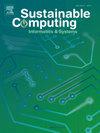Sustainable transient frequency management in eco-industrial park microgrids considering e-shared mobility storage using efficient fractional-order computing
IF 5.7
3区 计算机科学
Q1 COMPUTER SCIENCE, HARDWARE & ARCHITECTURE
引用次数: 0
Abstract
The evolving architecture of rich-renewable Eco-Industrial Park Microgrids (EIP-MGs) introduces significant frequency stability challenges due to the intermittent nature and low inertia of integrated renewable energy sources. To address these limitations, advanced energy storage systems, comprising fixed and mobile electric energy storage systems, have been adopted. Among them, mobile EV energy storage, particularly in the context of e-shared mobility, offers a flexible and scalable solution for load frequency control in modern EIP-MGs. This study presents a novel framework for sustainable transient frequency management using a fractional-order computing-based hybrid cascade controller, TFOID–3DOF–TID (Tilted Fractional-Order Integral and Derivative with Three Degrees of Freedom), optimized via the Crested Porcupine Optimizer (CPO). The proposed control scheme is validated through six case studies under three industrial load disturbance scenarios, with emphasis on transient stability and real-world uncertainties. The evaluations are structured around frequency-domain design criteria based on integral error metrics, including squared and absolute formulationsaimed at analyzing efficiency, sensitivity, adaptability, robustness, stability, and computational burden. The proposed control scheme, featuring the TFOID and 3DOF-TID controllers, is evaluated in comparison with validated metaheuristic-based algorithms. Simulation results demonstrate that the CPO-based TFOID–3DOF–TID controller consistently outperforms other schemes, with improvements including a 22 %–48 % reduction in settling time, a 25 %–55 % decrease in undershoot, and a 30 %–60 % reduction in overshoot across varying scenarios. Additionally, Bode plot evaluations confirm superior phase margins and damping characteristics, while robustness margins improve by up to 60 %, affirming the controller’s resilience under non-ideal operational conditions. These findings provide practical insights for policymakers and engineers aiming to enhance the resilience and sustainability of future-ready industrial microgrids.
基于高效分数阶计算的生态工业园区微电网暂态频率管理
由于集成可再生能源的间歇性和低惯性,丰富可再生生态工业园区微电网(eip - mg)架构的不断发展带来了显著的频率稳定性挑战。为了解决这些限制,采用了先进的储能系统,包括固定和移动电力储能系统。其中,移动电动汽车储能,特别是在电动共享出行的背景下,为现代eip - mg的负载频率控制提供了灵活和可扩展的解决方案。本研究提出了一种新的可持续瞬态频率管理框架,该框架使用基于分数阶计算的混合级联控制器TFOID-3DOF-TID(倾斜分数阶积分和三自由度导数),通过冠状Porcupine Optimizer (CPO)进行优化。通过三种工业负荷扰动情景下的六个案例研究验证了所提出的控制方案,重点研究了暂态稳定性和现实世界的不确定性。评估是围绕基于积分误差度量的频域设计标准构建的,包括平方和绝对公式,旨在分析效率、灵敏度、适应性、鲁棒性、稳定性和计算负担。采用TFOID和3DOF-TID控制器的控制方案与经过验证的元启发式算法进行了比较。仿真结果表明,基于cpo的TFOID-3DOF-TID控制器始终优于其他方案,在不同场景下,其改进包括沉降时间减少22 % -48 %,过冲减少25 % -55 %,超调减少30 % -60 %。此外,波德图评估确认了优越的相位裕度和阻尼特性,而鲁棒性裕度提高了60% %,确认了控制器在非理想操作条件下的弹性。这些发现为旨在增强面向未来的工业微电网的弹性和可持续性的政策制定者和工程师提供了实用的见解。
本文章由计算机程序翻译,如有差异,请以英文原文为准。
求助全文
约1分钟内获得全文
求助全文
来源期刊

Sustainable Computing-Informatics & Systems
COMPUTER SCIENCE, HARDWARE & ARCHITECTUREC-COMPUTER SCIENCE, INFORMATION SYSTEMS
CiteScore
10.70
自引率
4.40%
发文量
142
期刊介绍:
Sustainable computing is a rapidly expanding research area spanning the fields of computer science and engineering, electrical engineering as well as other engineering disciplines. The aim of Sustainable Computing: Informatics and Systems (SUSCOM) is to publish the myriad research findings related to energy-aware and thermal-aware management of computing resource. Equally important is a spectrum of related research issues such as applications of computing that can have ecological and societal impacts. SUSCOM publishes original and timely research papers and survey articles in current areas of power, energy, temperature, and environment related research areas of current importance to readers. SUSCOM has an editorial board comprising prominent researchers from around the world and selects competitively evaluated peer-reviewed papers.
 求助内容:
求助内容: 应助结果提醒方式:
应助结果提醒方式:


